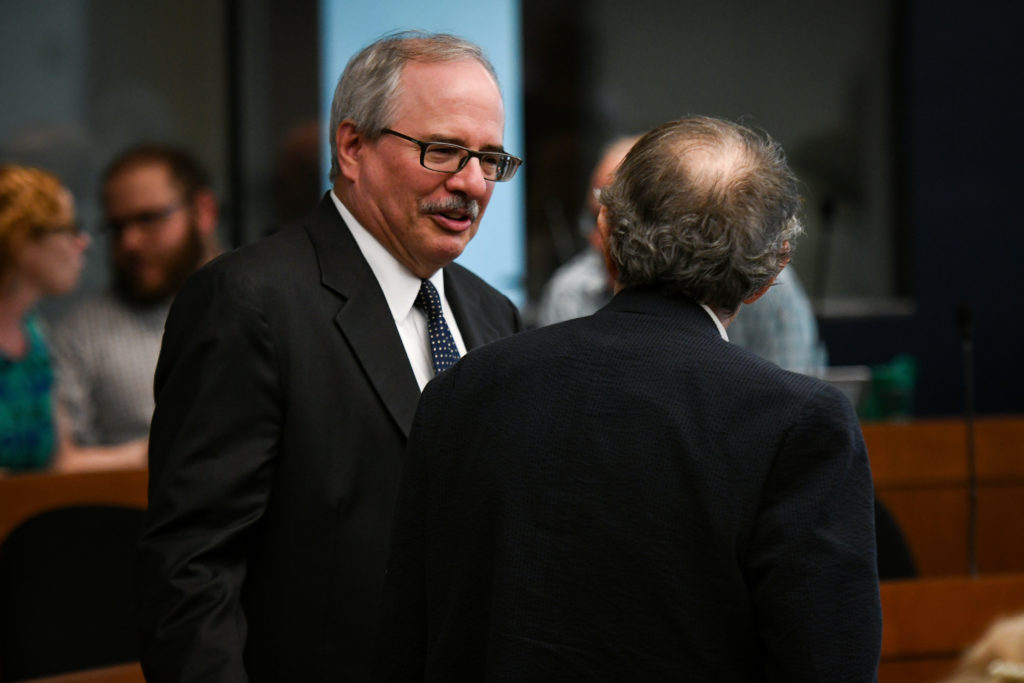Officials at each of the University’s 13 schools will now meet with GW’s top brass four times a year to discuss their fundraising progress.
University President Thomas LeBlanc announced at a Faculty Senate meeting earlier this month that deans and University leaders will start meeting quarterly to discuss fundraising performance. Individual schools’ development offices will also update deans on fundraising progress in monthly reports, officials said.
“It creates an opportunity to think about teamwork, but it also creates an opportunity to think about accountability,” LeBlanc said.
The decision comes amid an administrative push to prioritize philanthropy efforts as GW seeks to boost its historically low alumni giving rate.
Following the close of the University’s largest capital campaign last year, officials declined to say whether individual schools met their respective fundraising goals. The School of Medicine and Health Sciences set a target of $225 million during the campaign and the Milken Institute School of Public Health attempted to reach $150 million.
Each school released its own fundraising goals and plans for how the money raised would be spent.
LeBlanc said the combination of monthly reports and quarterly meetings will help deans know exactly how their schools are performing over time.
“Philanthropy and constituent engagement is one of the University’s highest priorities,” University spokeswoman Lindsay Hamilton said. “The addition of quarterly meetings between university leadership and the Division of Development and Alumni Relations and monthly fundraising reports for all deans will increase communication, teamwork and accountability in our fundraising efforts.”
Hamilton declined to say if new reports and meetings were inspired by individual schools’ success in hitting their fundraising targets during the $1 billion campaign. She declined to say what the monthly reports will include, where the quarterly meetings will be held or what officials will discuss during the meetings.
Experts in development and fundraising said that making a conscious effort to improve teamwork between administrators can be helpful for achieving fundraising goals because officials can strategize and tackle projects together.
Phil Hills, the president and CEO of fundraising consulting firm Marts & Lundy, said that involving deans regularly in fundraising efforts can help the University acquire large donations that go toward multiple schools. GW received such a gift in 2014, when it received an $80 million donation from two billionaires that renamed the Milken Institute School of Public Health and established a global center for health and wellness on campus.
He said the new reports could help GW raise more money during its campaigns because deans and administrators are constantly working together to strategize fundraising efforts.
“The president is making a really good decision to put this in place, and working with the deans is the way to do that,” Hills said.
Hills added that increased communication reduces overlap between strategies and donors within institutions – problems that could confuse donors who aren’t familiar with the internal fundraising process.
“The vast majority of universities that do good fundraising and are successful have an internal reporting system like this,” Hills said.
In instituting the meetings and reports, GW joins at least two of its peer schools with similar development structures – Tufts University and the University of Southern California.
Margot Biggin, the executive director for university advancement at Tufts University, said the institution mandates ongoing communication about the university’s and schools’ plans and how those translate into fundraising priorities.
“We have regular meetings and written reports regarding fundraising progress so that we can plan, set goals, track our progress against goals, coordinate and share important information,” Biggin said.
The University of Southern California has a similar structure, with more than 300 people at the university dedicated to fundraising and required reports. Rachel Morrell, the associate dean and chief development officer at USC’s Marshall School of Business, said the reports keep fundraisers competitive among their peers.
“Everybody knows what is going on each month, and I think that can motivate fundraisers to have a higher level of activity,” Morrell said.
John Martin, the president and managing partner at MGI Fundraising Consulting Inc., said officials need to be accountable by owning the work that is involved in a campaign and the money spent using the reports. The meetings and reports are a way to ensure transparency and compel the deans to examine how much of the money raised comes back to their schools, Martin said.
“Everybody should be working consciously together for the same goals to make this university stronger, to create more opportunities for young people to take advantage of a great institution and ensure they are getting a quality institution,” Martin said.





